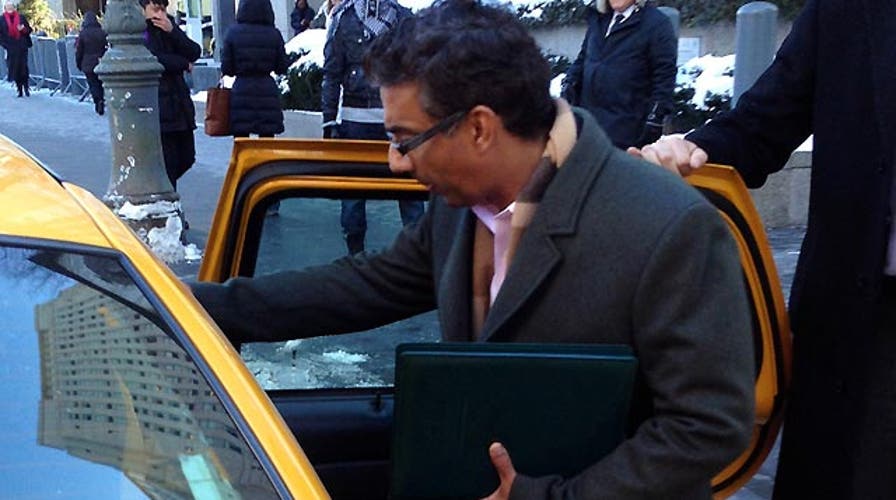Are charges against Dinesh D'Souza politically motivated?
Filmmaker pleads not guilty to campaign finance violations
Less than a year after the IRS admitted to singling out Tea Party and other like-minded groups, federal agencies and prosecutors once again are facing accusations of going tougher on conservatives than their liberal counterparts.
In a case that riled conservative filmmakers and producers, federal prosecutors last week announced campaign finance charges against Dinesh D'Souza, the documentarian behind an anti-President Obama film released during the 2012 presidential campaign.
D'Souza pleaded not guilty on Friday, though his attorney did not outright deny that a violation of some kind may have occurred.
But colleagues rallied to D'Souza's defense, calling the decision to prosecute the case politically motivated.
"When you make a film that hits the president between the eyes and could shift an election, you become a target," conservative filmmaker Dennis Michael Lynch told Fox News, referring to D'Souza's "2016: Obama's America."
Producer Gerald Molen, in a statement to FoxNews.com, called it a "selective prosecution."
Texas Republican Sen. Ted Cruz, on Sunday, also described it as part of a pattern during his interview on CBS' "Face the Nation." Though the comments were not aired on CBS, Cruz posted the full clip online.
"Can you image the reaction if the Bush administration had ... gone and prosecuted Michael Moore and Alec Baldwin and Sean Penn?" Cruz said. "It should trouble everyone the government uses government power and the IRS in particular to target their enemies."
D'Souza was charged with felony campaign finance violations, relating to allegations that he directed people to donate a total of $20,000 to New York Republican Senate candidate Wendy Long, and then reimbursed them.
His lawyer claimed there was no "quid pro quo" at play, "nor was there even any knowledge by the candidate that campaign finance rules may have been violated."
Federal officials, though, described the alleged violations as serious.
U.S. Attorney Preet Bharara said in a statement that the office and FBI take a "zero tolerance approach to corruption of the electoral process."
"If, as alleged, the defendant directed others to make contributions to a Senate campaign and reimbursed them, that is a serious violation of federal campaign finance laws," he said in a statement.
Prosecutors occasionally bring federal campaign finance cases against donors and politicians, from both parties. Perhaps the most high-profile in recent memory was the case against former Democratic presidential candidate John Edwards. He was charged with six felony counts, though he ultimately walked.
Edwards donor Pierce O'Donnell was also hit with three felony counts but pleaded guilty, in the end, to two misdemeanor charges. Nevada donor Harvey Whittemore was also convicted on felony charges for campaign finance violations last year, pertaining to contributions to Sen. Harry Reid, D-Nev.
But other cases have raised questions about whether conservatives are receiving additional scrutiny.
The New York Times reported last week that the right-leaning Hollywood group Friends of Abe has been receiving heavy scrutiny from the IRS for two years as it applies for 501(c)(3) nonprofit status. Unnamed sources told the Times they recently were hit with a "10-point request" for information on meetings with politicians. They reportedly said the IRS at one point demanded "enhanced access" to the group's website. This would have revealed the names of members, and the group did not comply.
The group's membership consists of conservative actors and other entertainment industry types. Unlike some of the groups singled out by the IRS over the last several years, Friends of Abe is seeking a status that would prohibit partisan activity.
In New Jersey, Republican Gov. Chris Christie's administration, meanwhile, is getting hit from all sides after emails surfaced showing a top aide and others were involved in controversial bridge lane closures last year. The emails indicated the closures were politically motivated, though Christie has adamantly denied any knowledge of the scheme.
Last week, the attorney representing Christie's campaign said federal prosecutors subpoenaed the campaign and a state Republican Party committee.
At the state level, accusations of targeting also emerged last week in New York. Conservative activist James O'Keefe claimed that the state Department of Labor had hit his office in Westchester County, N.Y., with demands for financial documents for months, and most recently a subpoena. He called it part of a "witch hunt."
The state Department of Labor, though, described the requests as routine, and part of a process to ensure businesses that use independent contractors classify their workers appropriately.
"In this instance, as we did in 3,500 cases last year alone, the Department of Labor sought this additional information. After receiving no response, DOL issued follow up letters and phone calls. After 6 months of not receiving a response, as a matter of protocol, DOL issued subpoenas to obtain the requested information," the department said in a statement.





